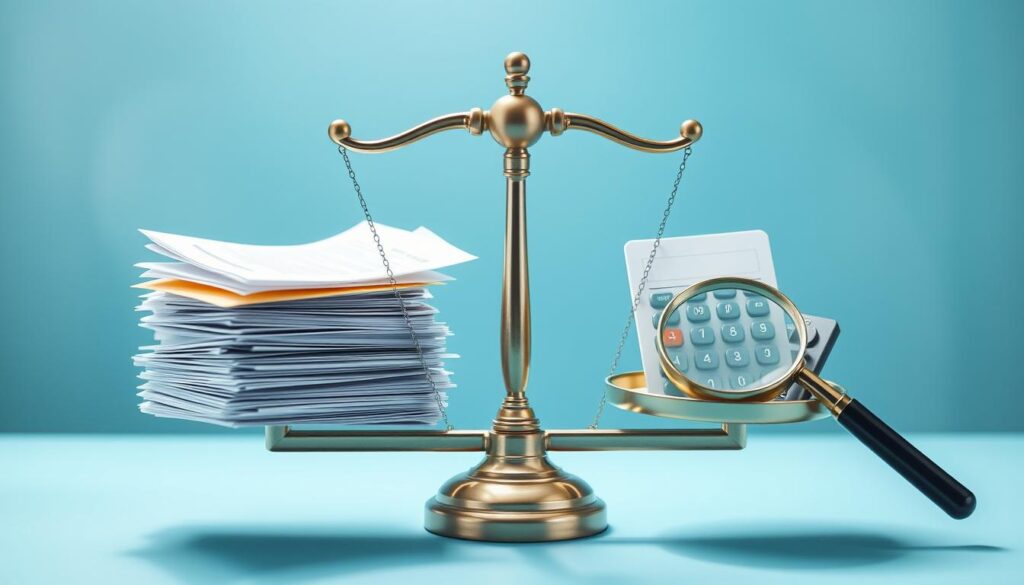Boosting your credit score can be tough. Our Advanced Credit Repair Course is here to help. We’ll teach you how to improve your credit and secure your financial future.
You’ll learn strategies to tackle negative entries and manage your credit better. We’ll also show you how to protect your identity from fraud.
This course covers all aspects of credit repair. You’ll understand credit reporting and scoring methods. We’ll teach you debt settlement tactics and how to use credit counseling services.
Whether you’re rebuilding after a setback or aiming higher, this course is for you. It’s your key to long-term credit success.
Key Takeaways
- Gain a comprehensive understanding of credit reporting and scoring systems
- Discover proven strategies for removing negative entries from your credit report
- Learn effective debt settlement techniques and how to negotiate with creditors
- Explore the role of credit counseling services and their impact on your credit
- Protect your identity and prevent fraud through proactive credit monitoring and theft prevention measures
Mastering the Fundamentals of Credit Repair
Your credit report is vital for effective credit repair. It shows your financial history and affects your credit score. By studying it, you can find ways to improve your creditworthiness.
Understanding Your Credit Report
A credit report details your credit activities. It includes payment history, credit use, inquiries, and public records. This info comes from creditors and financial institutions.
Your report is used to calculate your credit score. Learning about its sections helps you grasp its impact on your finances.
Decoding Credit Scoring Methodologies
The main credit scoring models are FICO and VantageScore. They use different factors to rate your creditworthiness. These include payment history, credit use, and credit types.
Knowing these models helps you make smart choices. You can then take steps to boost your credit score.
| Scoring Model | Key Factors | Score Range |
|---|---|---|
| FICO | Payment history, credit utilization, length of credit history, types of credit used, new credit | 300-850 |
| VantageScore | Total credit usage, credit balances, credit mix and experience, payment history, age of credit history | 300-850 |
Learning about your credit report and credit scoring methodologies is crucial. It’s the first step to master credit repair and improve your finances.
Strategies for Removing Negative Entries
Negative entries on your credit report can hurt your credit score. These blemishes can impact your creditworthiness. Luckily, you can remove these negative entries and fix your credit report.
Start by reviewing your credit report for inaccuracies. Look for errors, incomplete information, or unverifiable data. This includes late payments, collections, or fraudulent accounts.
Once you’ve identified issues, start a credit dispute with the credit bureaus. Gather supporting documents like payment records or identity theft affidavits.
- Gather all the necessary documentation, such as payment records or identity theft affidavits, to support your dispute.
- Craft a detailed, well-written dispute letter that outlines the specific errors and requests the bureau to investigate and remove the negative entries.
- Submit your dispute through the appropriate channels, whether it’s online, by mail, or by phone, and follow up to ensure timely and accurate resolution.
Sometimes, you’ll need to work with creditors or collection agencies directly. Provide evidence and negotiate in good faith. This can lead to settlements or agreements to remove negative items.
| Negative Entry | Dispute Strategy | Success Rate |
|---|---|---|
| Late Payments | Provide payment records and dispute with the credit bureaus | 60% |
| Collections | Negotiate with the collection agency and provide settlement documentation | 75% |
| Identity Theft | File an identity theft affidavit and dispute with the credit bureaus | 90% |
Success in removing negative entries requires persistence and thorough documentation. Stay focused on your goal. With these strategies, you can improve your credit report and secure a brighter financial future.
Building a Solid Credit History
A strong credit history is vital for your financial future. On-time payments and responsible credit card use are key factors. These habits can lead to better financial opportunities.
The Importance of On-Time Payments
Your payment history greatly affects your credit score. Paying bills, loans, and credit cards on time shows lenders you’re reliable. This can lead to better interest rates and higher credit limits.
Consistent on-time payments also improve your chances of getting favorable lending terms. Lenders view this behavior as a sign of good debt management.
Responsible Use of Credit Cards
How you use credit cards shapes your credit history. Keep a low credit utilization ratio – the amount of credit you’re using. Experts suggest using less than 30% of your available credit.
Having different types of accounts can strengthen your credit profile. This includes both installment loans and credit cards. A diverse credit mix shows you can handle various financial responsibilities.
“Responsible credit card usage, combined with timely payments, is the foundation of a robust credit history.”
Focusing on timely payments and smart credit card use builds a solid credit history. This can lead to greater financial flexibility and opportunities. Good credit helps with loans, renting apartments, and even getting mortgages.
| Key Factors | Impact on Credit History |
|---|---|
| On-Time Payments | Demonstrates reliability and responsible debt management |
| Credit Utilization Ratio | Maintaining a low ratio (below 30%) can boost your credit score |
| Credit Mix | Diversifying your credit accounts can further strengthen your credit profile |
Navigating Debt Settlement Tactics
Tackling outstanding debts can feel overwhelming. Our advanced credit repair course offers strategies to simplify debt settlement. You’ll learn to negotiate with creditors effectively, potentially leading to significant financial relief.
Negotiating with Creditors
Debt settlement negotiations can be a powerful tool. Through creditor negotiation, you might reduce interest rates or settle for less than owed. This can ease your financial burden and boost your creditworthiness over time.
Successful negotiations require understanding your rights and honing your skills. Our course guides you through effective communication with creditors. You’ll learn to present compelling arguments and reach mutually beneficial agreements.
With the right strategies, you can take control of your financial obligations. This paves the way for a brighter financial future.
“Negotiating with creditors can transform your debt management journey. The right approach unlocks opportunities for more manageable debt repayment.”
Our course equips you to handle various types of debt. You’ll gain tools to navigate debt settlement processes confidently. Start your journey towards financial freedom today.

The Role of Credit Counseling Services
Credit counseling services guide people towards financial stability. They offer resources and expertise in credit counseling, debt management, and credit repair. These organizations empower consumers to navigate complex financial landscapes.
Debt management programs are a key benefit of credit counseling services. They help consolidate multiple debts into one monthly payment. This often comes with reduced interest rates.
These programs can reduce overall debt burden. They also speed up the journey to financial freedom. Credit counseling services streamline the repayment process for individuals.
Credit counseling services also provide crucial financial education resources. They offer budgeting workshops and personalized credit-building advice. Consumers gain knowledge and tools for making smart financial choices.
| Service | Description |
|---|---|
| Debt Management Program | Consolidate multiple debts into a single monthly payment, often at a reduced interest rate. |
| Financial Education | Provide budgeting workshops and personalized guidance on credit-building strategies. |
| Credit Repair Assistance | Help navigate the complex process of disputing inaccurate or negative items on credit reports. |
These services also assist with credit repair. They guide individuals through disputing inaccurate items on credit reports. This helps improve credit scores and access better financing options.
Credit counseling services offer a path to financial well-being. They provide comprehensive solutions through debt management and education. Consumers can take control of their finances with these valuable resources.
Protecting Your Identity: Preventing Fraud
Protecting your identity is vital in our digital world. Identity theft can ruin your credit score and lead to financial losses. Active credit monitoring and strong protection measures are key to staying safe.
Regularly checking your credit reports helps catch identity theft early. You can spot suspicious activity and address issues quickly. This proactive approach safeguards your financial health.
Monitoring Your Credit Reports
Reviewing your credit reports often is crucial for identity protection. It helps you find any odd activity or unfamiliar accounts. Quick action on these issues can prevent bigger problems later.
Identity Theft Protection Measures
Besides watching your credit reports, take these steps to boost your identity protection:
- Utilize credit monitoring services to receive alerts of any changes to your credit file.
- Implement a credit freeze or fraud alert to restrict access to your credit information and prevent unauthorized applications.
- Regularly shred sensitive documents containing personal and financial information.
- Be cautious of phishing scams and never share your personal details over the phone or online unless you’ve initiated the interaction.
Protecting your identity takes effort, but it’s worth it. Stay alert and take action to keep your credit safe. These simple steps can make a big difference in your financial security.
“Identity theft is one of the fastest growing crimes in America. A complete credit report monitoring solution is essential for protecting yourself.”
| Service | Features | Cost |
|---|---|---|
| IdentityForce |
| $17.95/month |
| LifeLock |
| $9.99/month |
| Identity Guard |
| $8.99/month |

Advanced Credit Repair Course: A Comprehensive Approach
Our advanced course reveals secrets to comprehensive credit repair and credit score improvement. You’ll gain powerful advanced credit repair strategies to overcome complex credit challenges. This program will help you achieve lasting financial empowerment.
Explore the complex world of credit reporting and scoring methods. You’ll understand the factors that shape your financial profile. Learn expert dispute resolution techniques to remove negative entries and boost your credit score.
Develop responsible credit habits and build a solid credit history. Master on-time payments and strategic credit card use. Discover effective debt settlement tactics and the benefits of credit counseling services.
Learn to protect your identity and guard against fraud. Keep your credit profile secure with these essential skills. Use dispute resolution strategies and craft compelling letters to challenge inaccuracies.
This course is your guide to financial empowerment. Transform your credit and unlock your full potential. Pave the way for a brighter, more prosperous future.
“This course has been a game-changer for me. The strategies and tools I learned have helped me rebuild my credit and achieve financial freedom.”
– Sarah, Course Graduate
Leveraging Dispute Resolution Strategies
Effective dispute resolution is vital for credit repair. It helps you challenge inaccuracies on your credit report. Mastering this skill ensures your financial standing is accurately reflected.
Crafting Effective Dispute Letters
Dispute letter writing is crucial for credit dispute resolution. To write an effective letter, identify specific errors in your credit report. Present a clear case for their correction.
This process involves gathering supporting documents and articulating your claims. Deliver your letter promptly and professionally for the best results.
- Thoroughly review your credit report to pinpoint any credit report errors or credit report corrections that need to be addressed.
- Gather all relevant evidence and documentation to substantiate your credit dispute resolution claims.
- Compose a well-structured dispute letter that clearly outlines the inaccuracies and requests the necessary dispute letter writing corrections.
- Submit your dispute letter to the appropriate credit reporting agencies and creditors, ensuring prompt and effective credit dispute resolution.
These strategies help you navigate credit dispute resolution complexities. They allow you to take control of your credit profile. This paves the way for a brighter financial future.

“Effective dispute resolution is the cornerstone of successful credit repair. By identifying and challenging inaccuracies, you can ensure your credit profile accurately reflects your financial standing.”
Credit Scoring Guidelines for FICO and VantageScore
Credit scoring is key to your financial health. FICO and VantageScore are two main models used to assess creditworthiness. Each has its own set of rules and factors.
FICO is the industry standard for credit scoring. It looks at payment history, credit use, and credit length. FICO scores range from 300 to 850, with higher scores showing lower risk.
VantageScore was created by the three major credit bureaus. It uses a similar 300-850 scale but focuses more on recent credit behavior. The model also puts more weight on credit mix.
| Factor | FICO Scoring | VantageScore |
|---|---|---|
| Payment History | 35% | 40% |
| Credit Utilization | 30% | 20% |
| Length of Credit History | 15% | 21% |
| Credit Mix | 10% | 11% |
| New Credit | 10% | 5% |
Knowing these credit scoring models helps you make smart money choices. You can work on improving your credit score factors. This knowledge is a big step towards better finances.
Rebuilding Credit After Bankruptcy or Foreclosure
Recovering from bankruptcy or foreclosure is challenging but achievable. With the right approach, you can rebuild your credit and regain financial stability. Let’s explore the impact and steps to revive your credit.
Understanding the Impact
Bankruptcy and foreclosure can severely affect your credit score for up to 10 years. This makes it hard to get new credit, loans, or rental agreements.
However, the impact lessens over time. With proactive steps, you can start rebuilding your credit sooner than you might think.
Strategies for Recovery
- Obtain a copy of your credit report and thoroughly review it for any inaccuracies or errors. Dispute any incorrect information with the credit bureaus to improve your credit profile.
- Establish a new credit history by applying for a secured credit card or becoming an authorized user on someone else’s account. This can help you demonstrate responsible credit usage and start building a positive credit history.
- Make all your payments on time, as payment history is the most significant factor in your credit score. Set up automatic payments or payment reminders to ensure you never miss a due date.
- Consider seeking the assistance of a credit counseling service or a reputable credit repair company to help you navigate the credit rebuilding process and develop a personalized plan.
Rebuilding credit after bankruptcy or foreclosure takes time and effort. But with dedication and the right strategies, you can achieve financial freedom.
Stay focused on your goals. Remember, every positive step counts towards improving your credit score and financial health.

| Credit Rebuilding Timeline | Impact on Credit Score |
|---|---|
| 1 year after bankruptcy/foreclosure | Credit score may start to improve, but still significantly lower than pre-event levels |
| 3-5 years after bankruptcy/foreclosure | Credit score continues to improve, getting closer to the national average |
| 7-10 years after bankruptcy/foreclosure | Bankruptcy/foreclosure falls off credit report, allowing for a significant increase in credit score |
“The key to credit recovery is to be patient, persistent, and proactive. With the right steps, you can rebuild your credit and regain financial stability.”
The Importance of Credit Education Resources
Learning about credit is crucial for your financial health. Staying informed helps you make better decisions about your money. You’ll be better equipped to manage your credit and improve your financial standing.
Credit education covers many important topics. These include understanding credit reports and scoring methods. It also teaches strategies for building credit and managing debt.
By exploring these resources, you can take control of your finances. You’ll gain the knowledge needed to shape your financial future.
Accessing Credit Education Materials
Many credit education materials are available online. These include tutorials, articles, and interactive tools. Reliable sources offer resources to help you understand credit management.
You can find these materials from financial institutions and government agencies. Consumer advocacy organizations also provide valuable information about credit.
- Educational websites and blogs
- Budgeting and credit management apps
- Financial literacy courses and workshops
- Credit monitoring and reporting services
Seeking Expert Guidance
Consider getting advice from credit counseling services or financial advisors. These experts can offer personalized guidance for your credit challenges. They can help you create a plan for maintaining good credit.
“Investing in your credit education is one of the most valuable investments you can make for your financial well-being.”
Use the many credit education resources available to you. You’ll gain a deeper understanding of credit management. This knowledge will help you make smart financial choices.
Become a more financially literate consumer. Take control of your credit health and secure your financial future.
| Credit Education Resource | Key Benefits |
|---|---|
| Online Tutorials and Guides | Comprehensive information on credit-related topics, accessible at any time |
| Financial Literacy Courses | Structured learning programs that provide in-depth knowledge and practical skills |
| Credit Counseling Services | Personalized guidance and support from credit management experts |
| Credit Monitoring Tools | Real-time monitoring and alerts to help you stay on top of your credit profile |
Hiring a Professional Credit Repair Company
Some people choose to hire a credit repair company for help. These experts fix errors on credit reports and talk to creditors. They work to boost your overall credit score. It’s vital to check their services and fees before deciding.
Evaluating Services and Costs
Research the offerings and credit repair costs of professional providers carefully. Look for companies that offer a full range of services.
- Comprehensive credit report analysis and dispute management
- Negotiation with creditors to remove negative items
- Monitoring and updating of your credit file throughout the process
- Educational resources and guidance on building and maintaining good credit
Be aware of the credit repair costs for these services. Good companies should be clear about their prices. They shouldn’t have hidden fees or surprise charges.
Compare different credit repair companies and their costs. This will help you get the best value for your money.
| Credit Repair Company | Services Offered | Monthly Fees |
|---|---|---|
| Lexington Law |
| $99.95 |
| Sky Blue Credit |
| $79.00 |
| The Credit People |
| $99.00 |
Take time to review credit repair services and their costs. This will help you decide if hiring a company is right for you.
Maintaining Good Credit Habits
Excellent credit requires ongoing diligence and a long-term approach. Good credit habits are vital for your credit health and financial stability. Developing these habits ensures a secure financial future.
Developing a Long-Term Credit Strategy
A comprehensive long-term credit strategy is crucial for effective credit maintenance. This involves regular credit report monitoring and timely payments. Managing your credit utilization ratio is also important.
Stay proactive and adaptable to navigate the changing financial landscape. This approach helps align your credit habits with your financial planning goals.
- Review your credit reports regularly to identify and address any discrepancies or negative items.
- Consistently make on-time payments to build a strong payment history and demonstrate your reliability as a borrower.
- Maintain a healthy credit utilization ratio by keeping your credit card balances low in relation to your total available credit.
- Diversify your credit mix by responsibly utilizing different types of credit, such as credit cards, loans, and mortgages.
- Stay vigilant against identity theft and fraud, and take proactive measures to protect your personal and financial information.
Adopt these credit maintenance strategies to build a solid financial foundation. Cultivate good credit habits to navigate the credit landscape confidently. These practices support your long-term financial planning goals.
“Maintaining good credit is a lifelong journey, not a one-time destination. Consistency and vigilance are the keys to unlocking your financial potential.”
Conclusion
We’ve learned a lot in this advanced credit repair course. We’ve covered credit reporting basics, debt settlement, and credit counseling. These tools will help us take charge of our finances.
Improving your credit score takes time and effort. Stick to the methods we’ve discussed. Your credit score will reflect your good financial habits. Better loan rates and higher credit limits will follow.
Credit repair is unique for everyone. Keep an eye on your credit reports. Protect your identity. Build good credit habits. Use what you’ve learned to manage your finances confidently.

